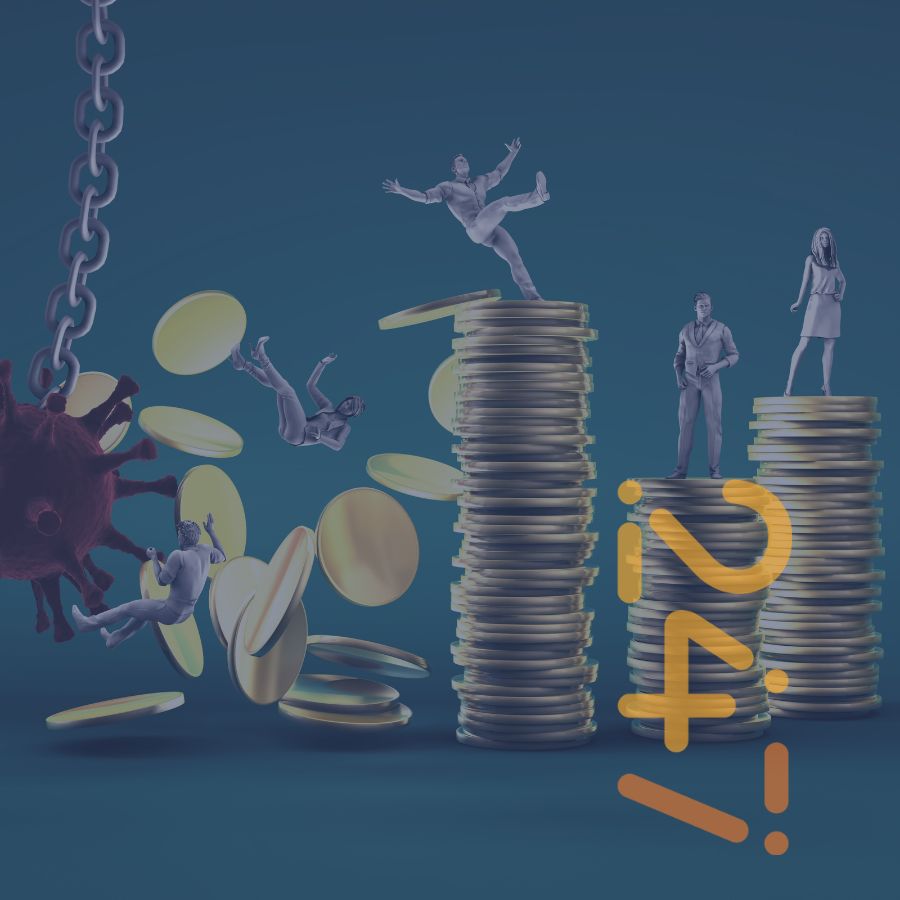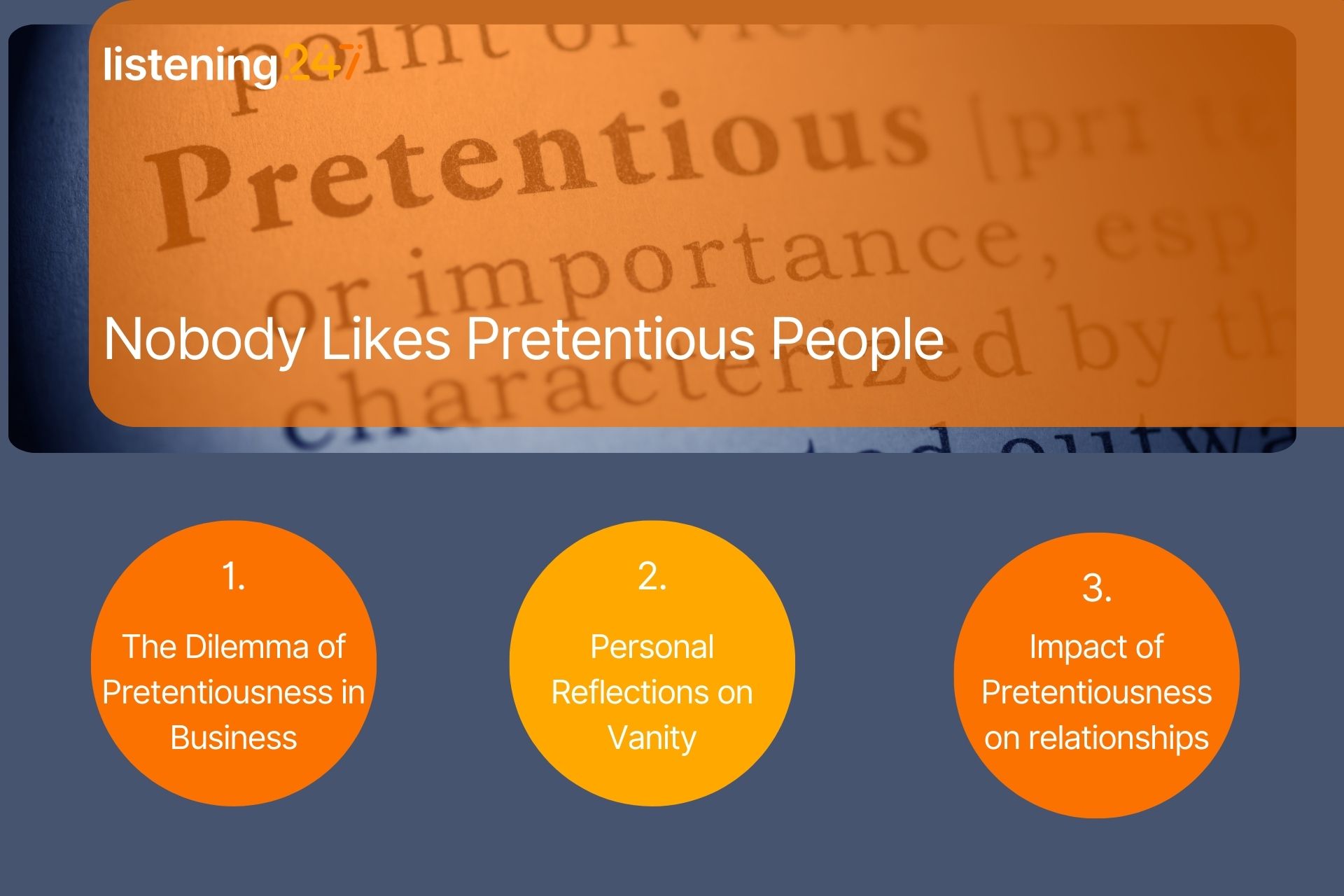
Blog Post
Nobody Likes Pretentious People

I’m afraid I am pretentious, but do I have a choice?
It’s always good to provide a credible definition of the subject from the get-go; this is the Oxford dictionary definition of the word pretentious:
Attempting to impress by affecting greater importance or merit than is actually possessed.
The root of the word is the verb ‘pretend’, and in this context a pretentious person is someone who pretends to be someone or something she/he is not - which sounds even worse than the Oxford definition.
Social media has probably exacerbated this quality in many people because it makes it easy to pretend hiding behind a screen.
I am the founder of listening247, which as you know is a scale-up that developed an AI based data analytics platform for the integration of unstructured customer data from social intelligence and solicited customer opinion from private online communities. In full disclosure, some of my friends on the advisory board of listening247 accuse me of being too much of an engineer - which I objectively am (by education) - and not enough of a marketer.
I always thought of myself as a man of substance when it comes to business, not one to add fluff to a statement to make it sound better than it really is. Who knows how others perceive me...
More and more I am getting the feeling that this is not a quality appreciated in an entrepreneur.
The founder of a Venture Capital firm told me recently that my 5 year revenue forecast is not aggressive enough, and in the same sentence he said: “I like to halve the sales and double the cost of an entrepreneur’s forecast”.
I found this somewhat confusing. Should I boost my revenue forecast beyond what I believe is safe to meet - and yes ideally exceed? Is it a sign of weakness and risk aversion to offer conservative forecasts in order to increase the probability of meeting or exceeding them?
Is there a fine line between being perceived pretentious and bullish in business?
Some introspection might help to flesh this out about myself, and hopefully in the process you as readers will find some value for yourselves as well.
When I was growing up in Platres - a village on the mountains in Cyprus, I had grand aspirations of becoming an astronaut, spearheading humanity to discovering new worlds. As a teenager I was also very conscious of branded clothing and shoes. Aspirational brands were Lacoste, Fred Perry, Levi’s, Adidas etc. So when I got my hands on a t-shirt or polo shirt of the “right” brand, I am positive I came across as very pretentious wearing it at school. Especially so, because my high school catered for around 20 villages of the region, full of kids from peasant families.
I was also very conscious about the make of the car that my family owned. I pegged our Lancia Beta and VW Golf somewhere in the middle of the ranking order. I was not very happy that we did not own a BMW or a Mercedes but could still live with not being at the bottom of the food chain.
In my final year as a student in Germany, I managed to buy myself a damaged 1979 Porsche 924 for 5,000 Deutsche Marks (approx. 3,500 US$) and drove it all the way to Cyprus, where I had the body fixed and painted red. How much more pretentious can a young man be than driving a red - so called “housewife’s Porsche” - in ‘91 in Cyprus?

Vanity is a vice similar to pretentiousness. I guess I was guilty of that too. This is a contradiction to what I mentioned above, about who I think I am today when it comes to business relations. I guess I’m still working through who I really am :).
Nobody likes pretentious people, even if they seemingly “like” their pretentiousness on Facebook or Instagram just to brown-nose them (also known as ass-kissing).
So then why do we do it? Why do we engage in creating a better image of ourselves than is really the case?
Disclaimer: I am no expert in sociology or psychology, this is just an attempt to interpret my own experiences - so similar to the 4 Pillars of a happy life, another theoretical experiment with one subject (myself).
When I have been vain and pretentious I think the motivation was to be liked, to get respect, maybe even admiration by some. In my case there was never a sinister agenda to make a product sound better than it is so that it can be sold or inflate a company’s forecasted sales so that it can get institutional funding.
What I have failed to see so far is: this approach delivers the exact opposite result with some people.
Maybe most people. Possibly all people.
The jury is still out about the business context and the acceptable marketing kind of embellishment - a grey area whereby the truth is bent to appear better, without lying per se.
Whether people see through the attempt to be liked and are turned-off by a person who appears to be needy or they resent it or they buy the boasting, they see it as such, and they are jealous.
In some cultures and even religions they believe in the “evil eye”! It is often explained as a negative energy emitted by a jealous person towards the one boasting - totally inconsequential whether the subject of boasting is factual or not. A girlfriend says to you: “I love your dress”. Next thing you know you spill tomato soup on it and not only the dress is ruined but you also burn yourself in the process. Whether you believe in a spiritual or scientific explanation of the “evil eye” or you consider it bogus one thing is for sure: if your words, appearance or actions elicit jealousy in people… this cannot be good for you.
"Does he think he is better than me?"
"How come she can afford this handbag? Is it fake?"
"I wish I had a car like his."
"She must be earning twice as much as I do… and she is so dumb."
"Why can I not have a baby and she has two and complaints about it?"
"Everyone thinks he is so handsome, what a great person he is… they should look closer."
There are people who think this way about you; so what do you think they say to other people on the subject when they get the opportunity? Nice things? Probably not.
Can the things they say harm your career, family life, friendships? You bet!
My conclusion is that I should stop being on stage and just be who I really am, all the time; if anything, go the other way, never advertise facts about me that I am proud of. I always knew that nobody likes a boaster, a pretentious person, a navel gazer but never thought of myself as one - apparently I was wrong. Everyone admires a humble and modest person…
...unless they think it is the cunning attempt of a pretentious person to be liked and gain respect!
In any case, I'll end this introspection here. It's good to do this from time to time, but business calls, and I need to go back to thinking about social intelligence, digital brand equity, social brand performance, online communities, CX measurement, and many other areas we work in.
Stay healthy everyone!